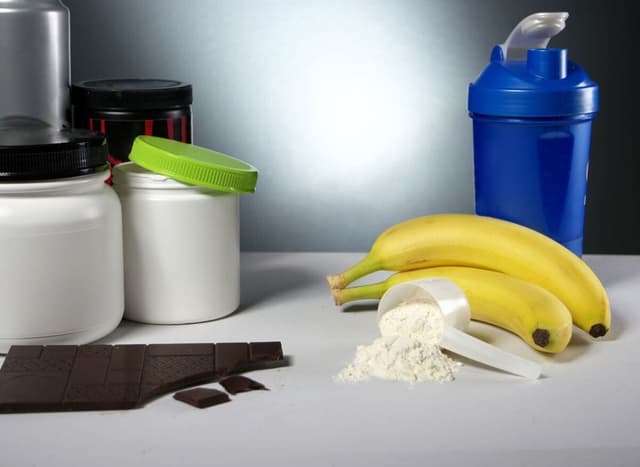Creatine and Weight Gain: What You Need to Know About Muscle Mass and Water

March 23, 2024
Creatine is one of the most popular supplements for enhancing muscle mass, strength, and overall athletic performance. If you're new to creatine or considering adding it to your regimen, you might wonder how it affects your weight. Specifically, there’s a common question: Does creatine lead to weight gain? The short answer is yes, but it’s not what you might think. Creatine helps increase muscle mass and may cause some water retention, but it doesn’t lead to fat gain. In this post, we’ll break down everything you need to know about creatine and weight gain, the role of water retention, and how to choose the best creatine for your fitness goals.
How Creatine Causes Weight Gain
When people talk about creatine and weight gain, they often associate it with bulking up quickly, which can sound intimidating. However, it’s important to understand what kind of weight gain creatine promotes. Here are the two main ways creatine impacts your weight:
1. Increased Muscle Mass
One of the primary benefits of creatine supplementation is its ability to help you gain muscle mass. Creatine works by increasing the availability of ATP (adenosine triphosphate) in your muscles, which allows for more energy during short bursts of high-intensity activity, like lifting weights. With more energy available, you can push harder during workouts, leading to more effective training and greater muscle growth.
Several studies have shown that creatine supplementation leads to significant increases in muscle size and strength over time. A meta-analysis published in the Journal of the International Society of Sports Nutrition revealed that individuals taking creatine gained an average of 2–4 pounds of lean muscle mass in just a few weeks of regular use.
This muscle mass increase is the type of weight gain most people look for when they add creatine to their routine. It’s not fat; it's lean, functional muscle tissue.
2. Water Retention
In addition to muscle mass, creatine can cause weight gain through water retention. Creatine draws water into your muscle cells, which makes them appear fuller and larger. This can result in a slight increase in body weight, especially in the initial stages of supplementation.
Some people are concerned about this water retention, thinking it might lead to a bloated or puffy appearance. However, the water is stored within the muscles, not under the skin, so most people experience a more toned and muscular look rather than puffiness.
Key Takeaway:
The weight you gain from creatine is typically due to increased muscle mass and water retention in your muscles, not fat. This makes it a valuable tool for athletes and anyone looking to enhance their physique.
Common Misconceptions About Creatine and Weight Gain
Despite its benefits, creatine is often misunderstood. Let’s clear up some common myths and misconceptions surrounding creatine and weight gain.
1. Creatine Makes You Fat
One of the biggest misconceptions is that creatine causes fat gain. This is simply not true. Creatine does not directly lead to fat gain. It promotes weight gain through muscle mass and water retention in muscle cells, not fat storage.
If you notice an increase in body weight after starting creatine, it’s most likely muscle or water weight. To avoid confusion, it’s important to track body composition, not just the number on the scale. Using methods like body fat percentage or measuring key muscle areas will give you a better understanding of your progress.
2. Creatine Causes Dehydration
Another misconception is that creatine dehydrates the body. While it’s true that creatine pulls water into your muscles, this doesn’t mean it leaves the rest of your body dehydrated. In fact, as long as you drink enough water throughout the day, you’re unlikely to experience dehydration. Proper hydration is key to minimizing any potential side effects like muscle cramps.
If you're concerned about dehydration, simply increase your daily water intake while using creatine to ensure you're staying well-hydrated.
3. Water Weight is Bad
The idea that water weight is bad often comes from a misunderstanding. While creatine does increase water retention, this occurs within the muscle cells, contributing to a fuller, more toned appearance. This isn’t the same as water retention that causes bloating under the skin. In fact, the increase in intracellular water can improve muscle function and appearance.
4. Only Bodybuilders Should Take Creatine
Creatine is often associated with bodybuilding, but it’s useful for anyone looking to improve their performance in high-intensity activities. Whether you’re a sprinter, swimmer, or gym-goer, creatine can help you push harder and recover faster. It’s not just for people aiming to bulk up.
Key Takeaway:
Don’t let myths deter you. Creatine is not fattening, doesn’t cause harmful water retention, and is useful for a wide range of athletes and fitness enthusiasts, not just bodybuilders.
How to Minimize Water Retention from Creatine
If you’re concerned about water retention or don’t want the initial increase in water weight, there are ways to minimize it while still benefiting from creatine supplementation.
1. Drink Plenty of Water
It may seem counterintuitive, but drinking more water can actually reduce the amount of water your body retains. When you’re well-hydrated, your body doesn’t need to hold on to extra water. Aim to drink at least 8 glasses of water a day, especially when taking creatine.
2. Choose the Right Type of Creatine
Not all creatine products are the same. Some forms of creatine are less likely to cause water retention than others. The best creatine for minimizing water retention is creatine hydrochloride (HCL), which tends to absorb more efficiently than traditional creatine monohydrate. However, creatine monohydrate is still the most studied and widely used form.
3. Opt for a Lower Dose
Our Top Recommendations

Optimum Nutrition Micronized Creatine Monohydrate Powder
Micronized for easy mixing, supports muscle growth and endurance.
See on Amazon$0.35 per 5g serving

Nutricost Creatine Monohydrate Micronized Powder
Third-party tested, non-GMO, 5g of pure creatine per serving.
See on Amazon$0.2 per 5g serving

NSF Certified, supports muscle power and recovery.
See on Amazon$0.46 per 5g serving

ProMix Creatine Monohydrate Powder
Micronized, additive-free, ideal for performance and recovery.
See on Amazon$0.36 per 5g serving

NOW Foods Sports Nutrition Unflavored
100% pure creatine, GMP certified, boosts strength and endurance.
See on Amazon$0.2 per 5g serving
While a standard loading phase involves taking 20 grams of creatine per day for 5–7 days, followed by a maintenance dose of 3–5 grams per day, you can start with a lower dose to avoid initial water retention. Taking 3–5 grams per day from the beginning can lead to similar benefits over time without the rapid increase in water weight.
4. Stay Active
Staying active and working out regularly can help your body manage water retention more effectively. When you're active, your muscles use the creatine and water more efficiently, helping to reduce any bloated feeling you might have from water retention.
5. Limit Sodium Intake
High sodium intake can exacerbate water retention. Try to reduce your intake of salty foods while taking creatine to avoid excessive water weight.
Key Takeaway:
By staying hydrated, choosing the right type of creatine, and maintaining an active lifestyle, you can minimize water retention while still gaining the benefits of creatine supplementation.
Finding the Best Creatine for Your Goals
There are many types of creatine supplements available, so how do you know which one is right for you? Here are the most common forms of creatine and what they offer:
1. Creatine Monohydrate
- The most studied and widely used form of creatine.
- Highly effective for increasing muscle mass and strength.
- Affordable and accessible.
- May cause some water retention.
2. Creatine Hydrochloride (HCL)
- More soluble than creatine monohydrate, leading to better absorption.
- Less likely to cause water retention.
- Often comes in capsule form for convenience.
3. Buffered Creatine
- Designed to reduce acidity in the stomach, which can improve absorption.
- Can be gentler on the digestive system for some users.
- Slightly more expensive than creatine monohydrate.
4. Micronized Creatine
- Creatine monohydrate that has been processed into smaller particles for better solubility and absorption.
- Less likely to cause stomach discomfort.
5. Creatine Ethyl Ester
- Marketed as a more easily absorbed form of creatine.
- Less research supporting its effectiveness compared to creatine monohydrate.
Key Takeaway:
For most people, creatine monohydrate is the best creatine due to its extensive research, effectiveness, and affordability. However, if you’re concerned about water retention or digestive issues, consider creatine HCL or micronized creatine.
Conclusion
Creatine is a powerful supplement that can significantly boost muscle mass, strength, and athletic performance. While it may cause some initial weight gain, this is typically due to increased muscle mass and water retention in your muscles—not fat. By understanding how creatine works and how to minimize water retention, you can make the most of this supplement without any unwanted side effects.
If you’re looking for the best creatine to support your fitness goals, creatine monohydrate is a great starting point. Just remember to stay hydrated, stay active, and choose the form of creatine that works best for your body and lifestyle.






